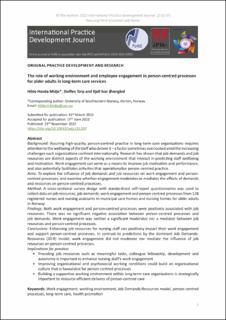The role of working environment and employee engagement in person-centred processes for older adults in long-term care services
Peer reviewed, Journal article
Published version
Permanent lenke
https://hdl.handle.net/11250/3060670Utgivelsesdato
2022Metadata
Vis full innførselSamlinger
Originalversjon
Midje, H. H., Torp, S., & Øvergård, K. I. (2022). The role of working environment and employee engagement in person-centred processes for older adults in long-term care services. International Practice Development Journal, 12(2), Artikkel 7. https://doi.org/10.19043/ipdj.122.007Sammendrag
Background: Assuring high-quality, person-centred practice in long-term care organisations requires attention to the wellbeing of the staff who deliver it – a factor sometimes overlooked amid the increasing challenges such organisations confront internationally. Research has shown that job demands and job resources are distinct aspects of the working environment that interact in predicting staff wellbeing and motivation. Work engagement can serve as a means to improve job motivation and performance, and also potentially facilitates activities that operationalise person-centred practice.
Aims: To explore the influence of job demands and job resources on work engagement and person-centred processes, and examine whether engagement moderates or mediates the effects of demands and resources on person-centred processes.
Method: A cross-sectional survey design with standardised self-report questionnaires was used to collect data on job resources, job demands, work engagement and person-centred processes from 128 registered nurses and nursing assistants in municipal care homes and nursing homes for older adults in Norway.
Findings: Both work engagement and person-centred processes were positively associated with job resources. There was no significant negative association between person-centred processes and job demands. Work engagement was neither a significant moderator nor a mediator between job resources and person-centred processes.
Conclusions: Enhancing job resources for nursing staff can positively impact their work engagement and support person-centred processes. In contrast to predictions by the dominant Job Demands-Resources (JD-R) model, work engagement did not moderate nor mediate the influence of job resources on person-centred processes.

